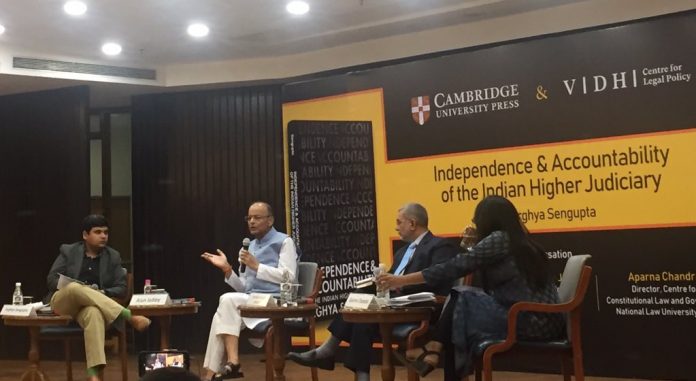
- 937Shares
New Delhi: Former Supreme Court judge Kurian Joseph said Thursday that he was beginning to regret his judgment against the National Judicial Appointments Commission (NJAC), which was set aside by a 4:1 majority. Justice Jasti Chelameswar, who also retired last year, was the sole dissenter.
The former judge and finance minister Arun Jaitley were in conversation at the launch of a book ‘Independence & Accountability of the Indian Higher Judiciary’, written by Arghya Sengupta, the head of think-tank Vidhi Centre for Legal Policy.
Jaitley defended the government’s push for the NJAC, which would have replaced the collegium system if the Supreme Court hadn’t set it aside.
The minister said he disagreed with the observations in the NJAC judgment, which said participation of the Executive violates the basic structure of the Constitution. The original Constitution envisaged a role for the Centre in the appointment of judges, he said.
Intimidation of judges
Jaitley, who is also a senior lawyer, said there is a growing trend of intimidating judges via social media. He said that in his time in Parliament, many cases related to the impeachment of judges had come in, and many more had been proposed.
“I am for the judges. Unless, of course, the facts are glaringly obvious,” Jaitley said.
He called it the process of mass intimidation of judges, and said it’s a very popular thing to throw mud at a judge. Frivolous reasons are being used to bully judges with impeachment; the process must be reserved for really serious cases, he said.
Justice Joseph said an in-house mechanism is the need of the hour to preserve the honour of the judges. He said his suggestions on the improvement of the system had been largely ignored, and that’s what was making him regret his judgment in the matter.
Joseph, who was part of the unprecedented press conference held by the four senior-most judges of the Supreme Court in January 2018 against Chief Justice of India Dipak Misra and his alleged maladministration, said the system is 100 per cent defective and needs to be streamlined.
Independence of the system
Joseph compared the independence of the system to the “chastity of a virgin”. He said the primacy of the judges has been eroded and the system compromised.
“The quorum of the bench should reflect the diversity,” Joseph said, adding that lawyers who argue the matter can more or less predict the judgment based on the quorum, and thus judgments can be manipulated by cherry-picking judges to get favourable results.
“The perception of faith of the people and the appearance of justice will depend on the courts. Judges must be perceived to be absolutely independent,” Joseph said.
Jaitley disagreed, saying he did not subscribe to the view that faith in the system had been eroded. “We sometimes create propaganda in our minds. Judges work in a different scenario now, which is less conservative,” Jaitley said.
Sealed covers
Reflecting on the trend of sealed covers at the Supreme Court, Joseph said that the “deity of justice is blind, but the justice delivery system must not blind”.
Jaitley said when judges start adjudicating matters beyond judicial purview, it’s difficult for them to get out of it. In such cases, transparency becomes an issue — what should one tell the public and what not.
The judge starts regretting taking the case, and hence the sealed cover comes in, he said.
Check out My543, our comprehensive report card of all Lok Sabha MPs.
- 937Shares